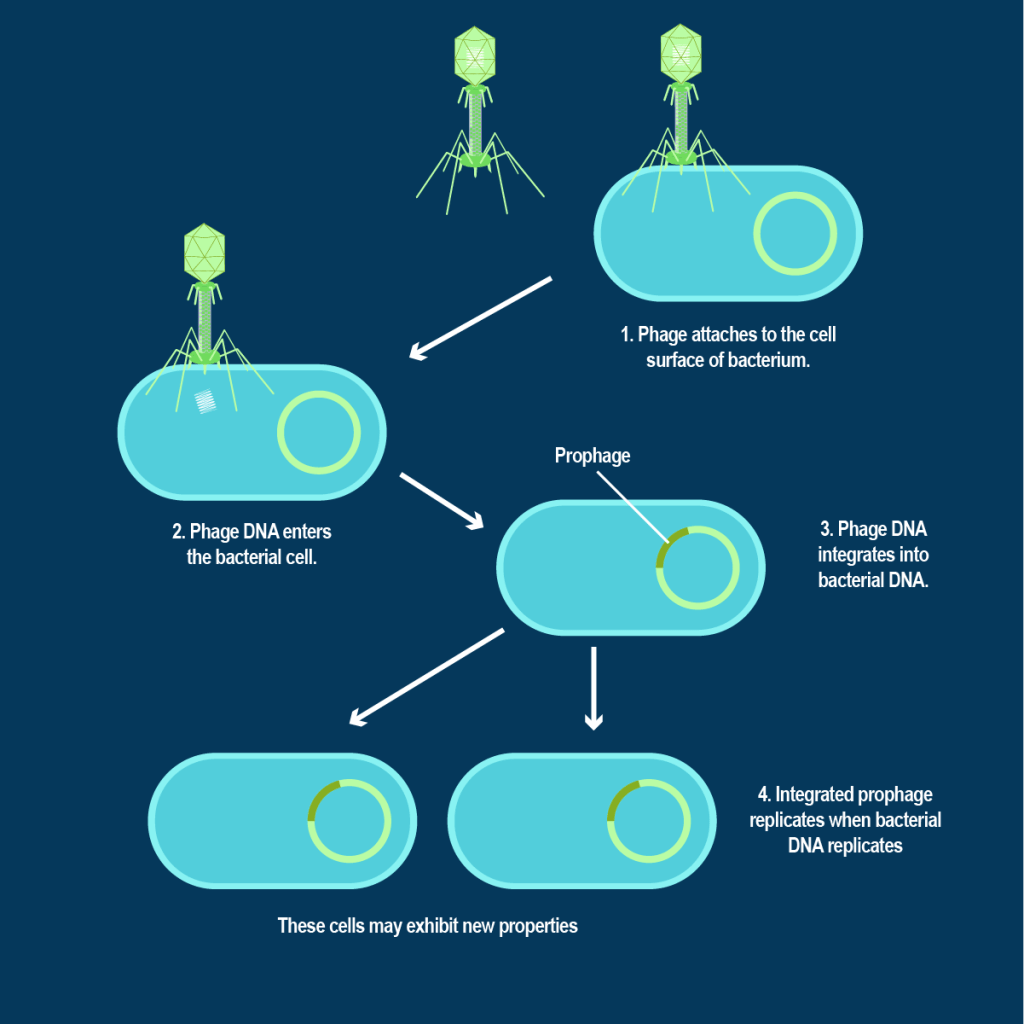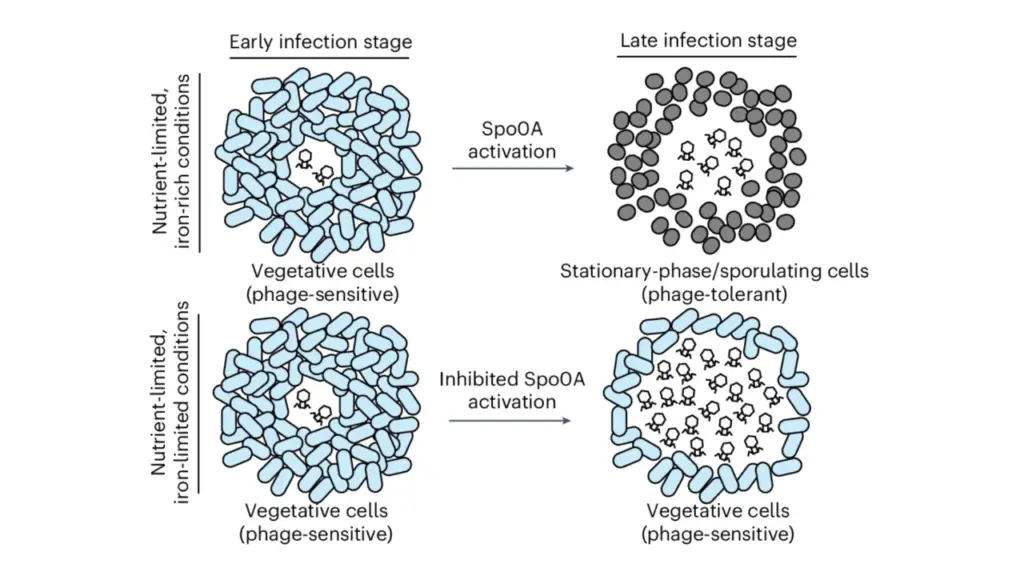
Bacteriophages are ancient viruses that exclusively parasitize bacteria. They are extremely diverse in their host range and they target bacteria of all different kinds and sizes. In other words, bacteriophages can be found everywhere, infecting every kind of bacterial species. However, it has long been debated whether bacteria can develop resistance to phage therapy. In this article, we examine the question of whether bugs (bacteria) can develop resistance against phage therapy and, if they can, whether this poses a problem for phage therapy.
Can bacteria develop resistance against bacteriophages?
Yes, bacteria can develop resistance against bacteriophages. It is possible for bacteria to develop resistance to different types of bacteriophages. Unlike antibiotics, bacteriophages can evolve to avoid the resistance mechanisms used by bacteria.
Underlying mechanisms of bacteriophage resistance
There are a number of possible mechanisms by which bacteria can develop resistance against bacteriophages. Bacterial resistance to phage attacks can be achieved through a variety of mechanisms, including spontaneous mutations, restriction-modification systems, and adaptive immunity via the CRISPR-Cas system.
Restriction modification systems
To defend themselves against these invasions, bacteria have developed defense mechanisms. This defense is provided by the restriction-modification system. This system consists of a restriction endonuclease enzyme and a methylase enzyme, and each bacterial species and strain has its own set of restriction and methylating enzymes.
Restriction enzyme
an enzyme that cuts DNA at internal phosphodiester bonds; there are several types, but the most useful for molecular biology (Type II) are those that cleave at a specific DNA sequence. To defend themselves against these invasions, bacteria have developed defense mechanisms. This defense is provided by the restriction-modification system. This system consists of a restriction endonuclease enzyme and a methylase enzyme, and each bacterial species and strain has its own set of restriction and methylating enzymes.
Methylase
an enzyme that adds a methyl group to a molecule; in bacteria’s restriction-modification systems, a methyl group is added to DNA at a specific site to protect it from restriction endonuclease cleavage.
Spontaneous mutations
Random population variation is aided by spontaneous mutations, which occur at a rate of one in 1000000 to 1000000000. Because bacteria are haploid for the majority of their genes and have a short generation turnover, phenotypic variation caused by point mutations can occur quickly.
Adaptive immunity via the CRISPR-Cas system
Clustered regularly interspaced short palindromic repeats (CRISPR) and their associated proteins (Cas) exhibit a prokaryotic adaptive immune system that remembers previous infections by incorporating short sequences of invading genomes, known as spacers, into the CRISPR locus. So far, CRISPR-Cas is the only adaptive immune system in prokaryotes that have been discovered.
Random population variation is aided by spontaneous mutations, which occur at a rate of one in 1000000 to 1000000000. Because bacteria are haploid for the majority of their genes and have a short generation turnover, phenotypic variation caused by point mutations can occur quickly.
Is Bacteriophage resistance problem to phage therapy?
The quick answer is yes. Although scientists have devised various methods to mitigate this, including the use of phage cocktails, phage training, and even bioengineering the phage particles. Some shocking discoveries have also made the use of phage therapy so intriguing. For example, as bacteria develop resistance to phages, they tend to lose resistance to antibiotics. Mutations in surface virulence factors, such as Lipopolysaccharides (LPS), may cause phage-resistant bacteria to become less virulent. Similarly, the upkeep of anti-viral defense systems, such as DNA restriction-modification enzymes and CRISPR-Cas adaptive immunity, comes at a cost.
I hope you have enjoyed reading this article as much as we have enjoyed writing it! Don’t forget to sign up for our newsletter to receive article alerts straight to your inbox.
References
- Oechslin F. (2018). Resistance Development to Bacteriophages Occurring during Bacteriophage Therapy. Viruses, 10(7), 351. https://doi.org/10.3390/v10070351
- Hille Frank and Charpentier Emmanuelle 2016CRISPR-Cas: biology, mechanisms and relevancePhil. Trans. R. Soc. B3712015049620150496. http://doi.org/10.1098/rstb.2015.0496
- Chandran C, Tham HY, Abdul Rahim R, Lim SHE, Yusoff K, Song AA. Lactococcus lactis secreting phage lysins as a potential antimicrobial against multi-drug resistant Staphylococcus aureus. PeerJ. 2022 Mar 1;10:e12648. doi: 10.7717/peerj.12648. PMID: 35251775; PMCID: PMC8896023.
- Castledine, M., Padfield, D., Sierocinski, P., Soria Pascual, J., Hughes, A., Mäkinen, L., Friman, V. P., Pirnay, J. P., Merabishvili, M., de Vos, D., & Buckling, A. (2022). Parallel evolution of Pseudomonas aeruginosa phage resistance and virulence loss in response to phage treatment in vivo and in vitro. eLife, 11, e73679. https://doi.org/10.7554/eLife.73679
- Fang, Q., Feng, Y., McNally, A., & Zong, Z. (2022). Characterization of phage resistance and phages capable of intestinal decolonization of carbapenem-resistant Klebsiella pneumoniae in mice. Communications biology, 5(1), 48. https://doi.org/10.1038/s42003-022-03001-y
- Runa, V., Wenk, J., Bengtsson, S., Jones, B. V., & Lanham, A. B. (2021). Bacteriophages in Biological Wastewater Treatment Systems: Occurrence, Characterization, and Function. Frontiers in microbiology, 12, 730071. https://doi.org/10.3389/fmicb.2021.730071




Comments